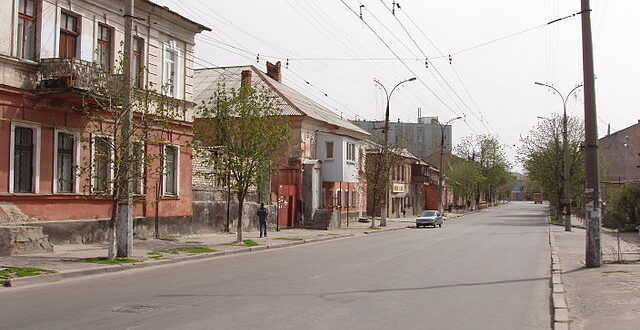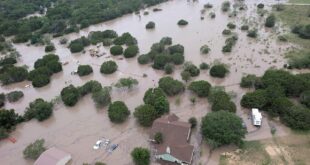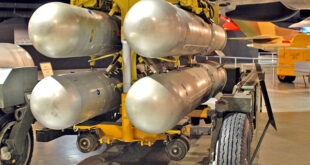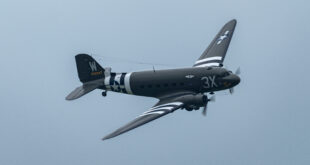by Aleksander Palikot
DUDCHANY, Ukraine — A group of people rushed down a dusty road toward a worn-out white minibus parked by a bombed-out school in this Kherson region village, split in half between Ukrainian and Russian Army control.
“Women and children get in; men will need to wait,” Serhiy Skoryk, the ex-soldier in charge of evacuating civilians across the front line in this area, shouted as the first of them hopped into the vehicle.
A stretch of water gleamed at the end of the street. The people jumping into the minibus had just left Kachkarivka, a village on the other side, picking their way across the ruins of what was once a bridge and now was a pile of rubble and crushed military vehicles.
When the minibus drove away with the first batch of people, a tall soldier told four men who remained to hide under a tree — there was a drone flying overhead. As the buzzing got louder and louder, the soldier, Andriy, said it was unclear whether it was Ukrainian or Russian.
But the men under the tree looked only mildly scared — their escape from the Russian occupation zone with its Russian soldiers was coming to an end.
According to Volodymyr, a middle-aged man who did not want his surname published for security reasons, there had been about 20 explosions in Kachkarivka over the past 24 hours. Five days earlier, he said, his neighbor was torn apart by a shell after he went to do some work in a field.
“It was high time to get out,” Volodymyr said.
Opposite Direction
The bangs of artillery sounded every few minutes in Dudchany, on the right, or western, bank of the Dnieper River. Under mounting pressure from the advancing Ukrainian Army, Russian troops withdrew from the northern part of the Kherson region, including from part of Dudchany, in early October. Now, Ukrainian troops are trying to push farther south to capture the strategic city of Kherson, which would deliver a huge blow to President Vladimir Putin’s campaign in Ukraine.
Meanwhile, the civilians remaining in the Russian-occupied villages and towns of the Kherson region are facing an increasingly dire reality.
The four men waiting for the minibus to return described how their village was plunged into anarchy, with Russian soldiers looting homes, threatening people with guns, and constantly drinking alcohol. Several people in the village were abducted, they said, and their whereabouts remain unknown. Two young men were jailed for five days and forced to sing the Russian anthem for shouting “Glory to Ukraine!”
Recently, the men said, new Russian troops arrived in the village and brought tanks and military vehicles with them.
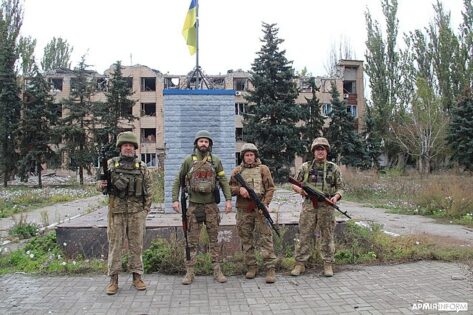
Oleksandr, whose wife and two children were already in the minibus, and who preferred to have his surname withheld, said for the past 10 days the Russian soldiers had been urging the residents of Kachkarivka to leave for Crimea, the Black Sea peninsula to the south that was occupied and taken over by Russia in 2014. Some of them did so, he said, including the Russian-appointed head of the village, whom he said residents suspected of taking the money from their pension funds with her.
He also said most of those who left had voted in favor of Russian annexation of the Kherson region in a September referendum organized by Moscow and dismissed as an illegal sham by Kyiv and much of the international community. He said the vote in Kachkarivka was held “at gunpoint.”
Since mid-October, Russian occupation authorities have been making efforts to pull civilians out of the territory they control on the western bank of the Dnieper. The top Russian-imposed official in the region, Volodymyr Saldo, said in late October that 70,000 people had crossed to the eastern bank.
To justify their relocation campaign — which they assert is a “humanitarian” effort but which Ukraine says includes forced deportations and the use of civilians as human shields — Russian officials have made evidence-free claims that Ukraine may use a “dirty bomb” to spread radiation in the region or blow up a major dam on the Dnieper to flood towns and villages.
But more than 50 people who left Kachkarivka on October 30 decided to go in the opposite direction. The white minibus was bound for Kryviy Rih, a Ukrainian-controlled city to the north, and the people lining up to get in were cheering, crying, and in some cases kissing the Ukrainian soldiers leading them across the bombarded village.
“It wouldn’t be possible if the Russians weren’t so corrupt,” said Skoryk, who organized the evacuation from Dudchany to Kryviy Rih. Several people from Kachkarivka said they each paid 2,000 hryvnyas ($54) to the Russian soldiers to let them leave the village. Neighbors with cars then drove them to the destroyed bridge in Dudchany, where the minibus waited for them on the other side.
“Russian soldiers said we were [leaving for Ukrainian-held territory] at our own risk,” said Tetyana, an evacuee who preferred not to reveal her surname for security reasons. One man made his way to Dudchany with an open head wound and had it wrapped in a bandage by a Ukrainian soldier.
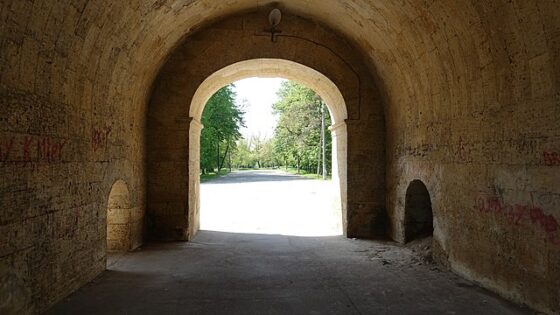
On The Road
Skoryk, a former soldier and ex-director of the nearby Kamyanska Sich nature preserve, has been handling evacuations since April. Almost every day, he and Eduard Laktyonov, who worked as an auto mechanic before the full-scale Russian invasion of Ukraine in February, have been racing along the bumpy, rugged roads of the Kherson region to help civilians escape the Russian occupation and to deliver humanitarian aid — food, medicine, household items — to the residents of the frontline villages.
Their work is organized by a charity funded by Kherson Regional Council Deputy Ihor Yosypenko, the owner of an agricultural enterprise that was operating in Kachkarivka before the Russian invasion. Before intensified fighting and the Russian deportations started, he said, his ties with the local population enabled him to help numerous civilians get out to safety.
Skoryk and Laktyonov come from parts of the Kherson region that are currently Russian-occupied: Nova Kakhovka and the adjacent village of Kozatske, respectively. Skoryk managed to get his parents out of his town only a week earlier, he said, while Laktyonov’s parents remain in their village; his wife and children are abroad, in Wales.
During the trip to Dudchany, the two men passed through Ukrainian military checkpoints after purely symbolic checks and were greeted by local officers of the Security Service of Ukraine (SBU). They wore camouflage military uniforms, although officially they are not soldiers.
As they approached the front line — driving down a road pitted by artillery fire, past burned-out Russian and Ukrainian tanks and vehicles lying on their sides — they nervously puffed on electronic cigarettes and sipped coffee bought a few minutes earlier at a gas station.
“There was Russian aviation working here yesterday,” said Laktyonov, who was at the wheel, as the car filled with dense fumes that smelled like bubble gum.
On the way to Dudchany, they stopped at the village of Chervone to distribute 41 bulky packs of humanitarian aid. Their arrival brought a wide smile to the face of Kolya, an 8-year-old boy with a plastic toy machine gun in his hands. His mother, Yana Chaban, said his father, who fought in the war that broke out in 2014 between Russia-backed militants and Ukrainian forces in the Donbas, farther east, had been abducted in June, and she has not heard from him since.
Liberated three weeks earlier, Dudchany is now close to the front line and has been bombarded frequently — sometimes with cluster and phosphorus bombs along with regular artillery shells, according to residents.
“They did whatever they wanted here”
One of the residents, Tatyana Derkach, held out her mobile phone and said she had been regularly sending information about Russian troop movements to the Ukrainian side.
“I was afraid, of course,” she said. “But these nonhumans did whatever they wanted here.”
Skoryk and Laktyonov said that in addition to evacuating civilians they also help Ukrainian forces spot Russian targets.
“Here’s a photo of an ‘orc’ that our boys shot two days ago when we were bringing people out,” Skoryk said, using a derogatory term and zooming in on a bullet hole in the head of a dead Russian soldier.
“And here you can see a collection of Russian coordinates that I sent to my friends in the army,” he added, and showed screenshots of Google Maps locations.
After a long and tense day, the white minibus pulled into Kryviy Rih in the evening. The evacuees from Kachkarivka who got out looked tired but relieved. A small child emerged from the vehicle and threw up on the pavement.
“He had too much chocolate,” his mother said.
Aleksander Palikot is an Ukraine-based journalist covering politics, history, and culture. This story first appeared in RFE/RL.
 Soldier of Fortune Magazine The Journal of Professional Adventurers
Soldier of Fortune Magazine The Journal of Professional Adventurers


